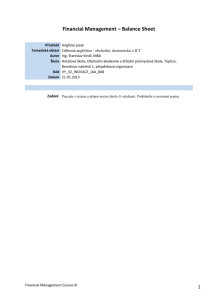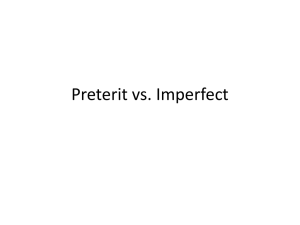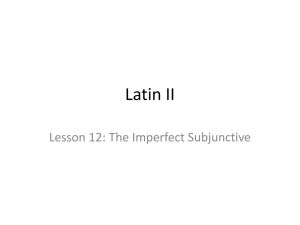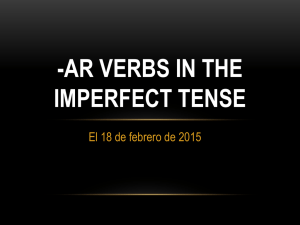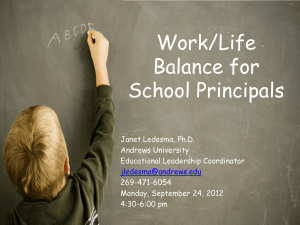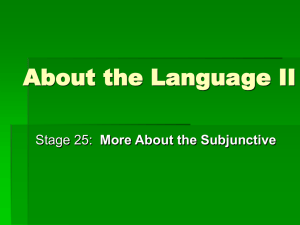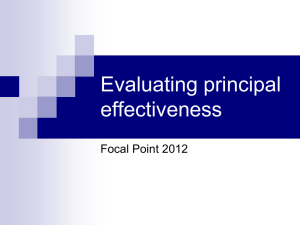Tinde Kovač Cerović, State Secretary, Ministry of
advertisement
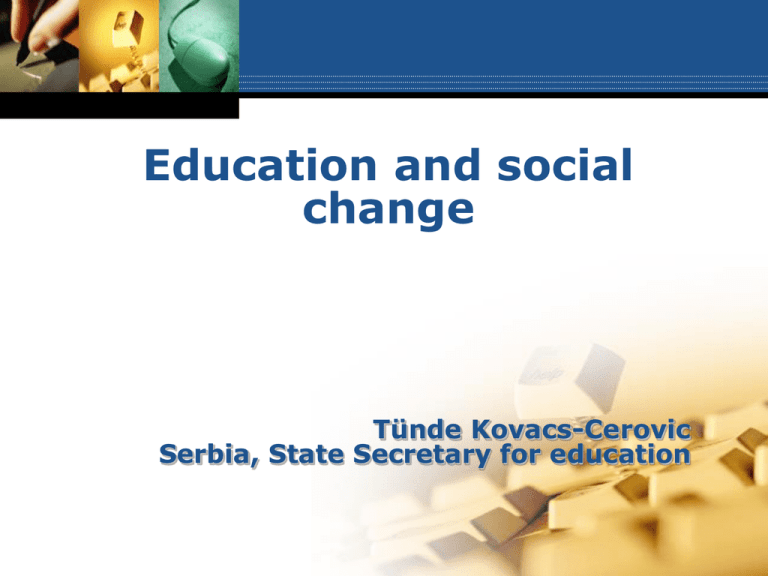
Education and social change Tünde Kovacs-Cerovic Serbia, State Secretary for education Content A couple of truisms Education in an imperfect context – Educational perspective – System perspective – Parents’ perspective Added value for education policy making Use some data on Serbia, some on the SEE region – no PISA Education policy and society Education is not an isolated system, it both reflects the societal dynamics and contributes to them Education has a transformative role – it shapes the future, but in order to shape it in the right way, it needs to be responsive to problems and needs Equity, quality and efficiency – core elements of education policy and vital for its contribution to social change Policy makers in SEE face similar challenges – a valuable opportunity for cooperation and mutual learning 3 1. Educational perspective Create the best context for human learning and development Educationalists try to maximize the frequency of learning and minimize contextual “intrusion” But School learning and motivation is situated in an imperfect context Educational attainment of population older than 15 Decline of number of students in secondary education Annual average decre ase more than 2 % Annual average decre ase between 1,5 % a nd 2 % Annual average decre ase between 1% and 1,5% Annual average decre ase between 0,5% an d 1% Annual average incre ase between 0 and 0, 5% Projections of decline in secondary school students until 2023/2024 290000 280000 270000 260000 250000 240000 230000 220000 210000 200000 Teachers’ age – comparative view 100% 90% 80% 70% 60% 50% Teachers aged >50 40% Teachers aged 40-49 30% Teachers aged 30-39 20% Teachers aged < 30 10% 0% uneven distribution of publi c investment Level of investment – comparative view Percentage of early school leavers – comparative view 2. System perspective Education reforms 2001-2004 2008-2011 Threefold priorities 2008: Equity, Quality, Efficiency Priorities of education policy Efficiency = Equity = Inclusive education Fiscal decentralization and EIS Quality = quality improvement: educational and social AREAS OF CURRENT DEVELOPMENTS Outcomes and standards New curricula Quality of teachers (36 ECTS) Clearer roles of sch ools, parents, studen Anti-discrimination measures, ts Violence prevention Capitation formula EIS Extended preschool Inclusion of marginalized groups Individual education plans Roma pedagogical assistants Free secondary edu. Recognition of prior learning Current moment Formulating priorities 2008 Legislative acts 2009 2010 Implementation from 2010 Monitoring and fine-tuning 2011 Long-term strategy developmen t 2012-2020 Good timing: Independent assessment very 15 important Current moment Monitoring and fine-tuning 2011 (equity and quality) Good timing for reflection: why not easier? Deeper layers of imperfect context 16 Imperfect context 1. Huge system - covers about 20% of the po pulation in the country, but is fragmented into small and dispersed units example of country of 6mil No of schools No of facilities No of classes No of teachers No of students G1-G12 1.800 4.500 40.000 70.000 1.100.000 Imperfect context 2. Perceived as major mechanism for social/economic promotion – high motivation, high incentives Imperfect context 3. Huge system of human intera ctions: interests, negotiations, conflicts, clans – all aspects of human nature present Imperfect context 4. Asymmetric relationships in its core: student -teacher, child-parent, parent-teacher (lack of voice, protectionism) Imperfect context Parents excluded (Roma parents even more excluded) – recent OSI study 21 Imperfect context: motivation? 0.6 0.4 0.2 0.0 -0.2 -0.4 -0.6 -0.8 Školska anksioznost Vanškolski status Obrazovanje je Osećanje je važniji od škole važno pripadnosti školi Bazična motivacija Samoefikasnost Obmanjivanje se dopušta Anksiozni i nezainteresovani (42%) Neanksiozni, motivisani i samoefikasni (17%) Anksiozni i zainteresovani (22%) Neanksiozni i nezainteresovani (19%) Rare event Schools are expected to be Places of intimate experience: – – – – – – Learning Deep understanding Motivation Creativity Respect Values – – – – Self-regulation Self-efficacy Self-esteem Self-description/attribution Places of development of the Self-concept: Can they easily become that? 23 Learning can become a really rare event Attended ... Listened ... Heard ... Understood ... Remembered ... Will apply ... Imperfect context: INTES Niches of corruption in educati on can diminish all the reform effects – Education is human capital development – Corruption creates the opposite – waste of human capital 2025 SCHOOL regulated teachers textbooks Personal benefits Social benefits curriculum equitable financing management assessment evaluation Research participatory accountable efficient Development Policies 26 financing Potential niches Allocation of resources: Leakage in money flow Private use of resources Ghost teachers Creativity of deception Procurement: construction, refurbishing, maintenance, equipment school materials utility bills Allocation of allowances, stipends, places in dormitories Decentralized distribution of funds, many transfer steps, many actors (tracking the funds needed) BOR assessment evaluation Potential niches Assessing students •Examinations frauds (entry/exit) •Grading •Promotion based on bribes •Selling diplomas Evaluating institutions manipulating external evaluations inspection Accrediting institutions, programs Major frauds: cases in Serbia: Law School University of Kragujevac + Ministry, 2007 January Enrolment exam for secondary education, 2008 June Potential niches Teacher management: teachers • Hiring/firing •Deployment •Licensing •Promotion •Training Teachers’ responsibilities distorted: •undue reporting •private tutoring •absenteeism, use of sick leaves •accepting extra fees, gifts •biased grading New regulations, but still low salaries, strong teacher unions (case of June 2011 legislation) Potential niches management ethos Who is managing and overseeing the schools? •Appointment of principals/deans/rectors •Appointment of school boards • selecting the Inspection Use of information systems: •Withholding information, •changing, manipulating data, •not producing data.. Accountability to students, parents •Student placements •Manipulating school boards •Manipulating parent councils •Not including students Major area of protectionism: student placements – each September School principals PE teachers 3. Parent perspective Imperfect context PARENT PARTICIPATION IN SEE Teachers’ and parents’ perceptions: Gray area between cooperation and conflict Teachers Parents The origin of unsatisfactory teacher-parent communication is perceived to lie wit hin the school who should initiate the collaboration being more responsive to pa rental and children’s needs (Lawson, 2003) The study 10 countries Albania B&H Bulgaria Croatia Two Principals’ perspective perspectives Kosovo Macedonia Montnegro Moldova Romania Serbia Parents’ perspective Two methodologi es Qualitative – focus groups Quantitative - survey Two levels Individual level: all data School level: parent representatives, means for parents, principals Four angles Mainstream parents Parent representati ves - MSP Excluded groups parents Parent representati ves - EGP Sample Principals Total Mainstre Exclud Parent Excl am ed repr parent rep Principals of all schools where from the sample was drawn Schools 311 Parents of children 7-15 urban rural total 9076 491 1359 124 11127 Parents’ Questionnaire Based on: 1.Literature review: 1. Epstien’s (1987) six dimensions of parental inv olvement 2. Green, Walker, Hoover-Dempsey and Sandler (2 007) model of the parental involvement process . 2.Results of focus group discussions in the 10 SEE co untries 3.Results of 2008 cross national study of school princ ipals Consisting of 3 parts: 1.Q for mainstream parents (used for all samples) 2.Q for excluded parents (additional part) 3.Q for parent representatives (additional part) 35 Questionnaire Mediating variables Child characteristics (age, gender, achievement etc) school informat meetings ion from school motivation for participation in school life Outcome variables satisfaction with satisfaction re child satisfaction re well-being, communication with influence progress in school school Background variables Dimensions of participation Family context (wealth, employment, etc) Supportin g learning at home perception of school openness Mother characteristics (education, aspirations) decis. schoolmaking commun ity coop volunte ering in school percepti beliefs about school-parents on of partnership pr’s 37 How does parent-school cooperation happen? Škola inicira roditeljski sastanak: Škola inicira individulani sastanak: 38 How does parent-school cooperation happen? Škola šalje informaciju o detetovom uspehu: Škola šalje informaciju o školskom radu: 39 How does parent-school cooperation happen? Škola šalje školski informator: Škola inicira volontiranje oko sportskih/kult. aktivnosti: 40 How does parent-school cooperation happen? Škola inicira volontiranje u razredu/nastavi: Škola inicira volontiranje u biblioteci, dvorištu…: 41 How does parent-school cooperation happen? Škola konsultuje roditelje oko školskih događaja: Škola konsultuje roditelje oko bezbednosnih odluka: 42 How does parent-school cooperation happen? Škola konsultuje roditelje oko ekstrakurikularnih odluka: Škola konsultuje roditelje oko finansijskih odluka: 43 How does parent-school cooperation happen? Škola konsultuje roditelje oko organizacije šk rada: Škola konsultuje roditelje oko obrazovnih pitanja: 44 How does parent-school cooperation happen? Schools do not invite parents (%) never 1 2-3 3+ - class 3 9 34 54 - individual 50 14 18 19 - infrastructure 70 17 9 4 - extracurricular 66 16 13 5 - curricular 86 7 5 2 - additional (library, lunch) 85 9 4 To meetings To volunteer 45 2 How does parent-school cooperation happen? Schools do not invite parents/cont (%) never 1 2-3 3+ - financial management 79 8 8 5 - extreacurricular activities 66 16 13 6 - organization of school event 45 25 21 8 - health safety issues 58 20 15 8 - school management shifts, merger 82 9 6 3 - education issues 75 10 10 5 - violence 65 15 13 7 To give opinion on In Roma sample “never” is around 90% Parents think their contribution is beneficial Parents think they are capable of contributing 47 2. How does parent-school cooperation happen? Systematic difference between parents’ and principals’ perception 48 3. How does parent-school cooperation happen? Problem attributed more to parents than schools. Parents are perceived as motivated and competent to participate 49 4. Outcomes of parent-school cooperation ? Parents are least satisfied with their possibility of influence 50 Conclusions Trends are expected, but their pervasiveness is striking – Discrepancy between the mainstream and the excluded sample – Discrepancy between parents’ and principals’ perception – Lack of opportunities for cooperation and partnership – Opportunities even less present for those who need it most 51 Conclusions/cont. • Individual parent level mediating variables do not predict outcomes strong enough - it seems that individual parental motivation, attitude, belief does not matter much • Main factor - parent representative: if interested, capable, effective, parents are participating more 52 Recommendations 1. Parent representatives in school: 1. Careful choice 2. Training and support 2. Embrace and cultivate all dimensions of parent participation 3. Parent participation on ”higher” levels 1. Municipal parent councils 2. National association of municipal parent councils 53 Conclusions 54 Added value of 1, 2, 3. Confirmation of vulnerable areas from independent angle (important for fine-tuning) Assistance in understanding bottlenecks in the system (important for strategy) Assistance in “labeling” risky practice strengthening the55reform agenda Added value general: Evidence for policymaking high quality Based on impressions Based on evidence low quality 56 Added value general: Organizing the learning niche LEARNING OF STUDENTS LEARNING OF TEACHERS LEARNING OF SCHOOLS LEARNING OF THE SYSTEM Added value general: Contributing to education for social change Legal instruments Researc h and monitori ng Educ ation Develop mental p riorities (equity a nd efficie ncy) Stakeholders participation 58 Joke or warning? Thank you for your attention (PS the slides used proved useful for communicating education reform priorities and processes to the wider public in Serbia) 60
